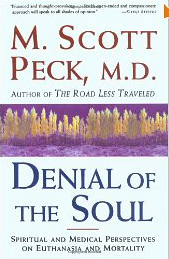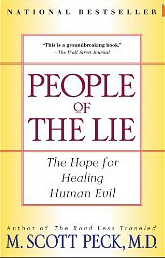M. Scott Peck
Books: Philosophy | Ethics | Health | Medicine
People of the Lie (1983), Denial of the Soul (1997)
Denial of the Soul (1997)
 My introduction to M. Scott Peck was the abridged audio version of this book, purchased when I regularly listened to books on tape at work, and preferred non-fiction to fiction. I listened to it several times, but when I chose physician assisted suicide as my topic for my legal/ethical issues in public health class, I felt that I wanted to read the entire book, and have it as a reference, for although I do not agree with all of what he says, I felt that he made many good points that I would want to expand upon for my project.
My introduction to M. Scott Peck was the abridged audio version of this book, purchased when I regularly listened to books on tape at work, and preferred non-fiction to fiction. I listened to it several times, but when I chose physician assisted suicide as my topic for my legal/ethical issues in public health class, I felt that I wanted to read the entire book, and have it as a reference, for although I do not agree with all of what he says, I felt that he made many good points that I would want to expand upon for my project.
He takes an in-depth look at euthanasia, and the spiritual side to dying.
I found one paragraph most interesting, solely for is seeming prediction of the two major PAS cases that went before the Supreme Court, Washington v Glucksburg and Vacco v Quill.
(I)n my best case fantasy the Supreme Court issues a majority opinion holding that physician-assisted suicide is not a constitutional right for a variety of reasons, including the perfect legitimacy of the double effect, which may be used to ensure that a natural death need not be a painful one.
The fact that this is almost precisely what the was ruled is slightly eerie and gave a strange legitimacy to everything else he said, whether I accepted it or not.
Not that there was much to argue with as far as his support for palliative care goes. He fully supports terminal sedation and the upholding of the double effect as an ethical principle for that. He says that "(t)he first order of business should be to establish that dying patients have a constitutional right to competent hospice care." Although there is not a legal right, there has been a huge shift in recent years, with the Medicare Hospice Benefit becoming more and more generous. And hospice itself becoming more common.
I was less comfortable with the more spiritual aspects of the book, and found them less convincing.
Like much of the research available, he states that many who request PAS and euthanasia do so not out of fear of physical pain, but because they fear emotional pain. I even like his quotation of Seneca:
Throughout the whole one must continue to learn how to live and, what will amaze you even more, dear friends, throughout life one must continue to learn how to die.
What bothers me may be something that is probably not an issue for the intended audience, those who have deep religious faith. My problem is that I am not certain that the best argument against euthanasia and physician assisted suicide is a religious one, yet this is the primary argument that he makes in the book.
But he makes many good and important points, the foremost of which is that it is futile to have a debate about PAS and euthanasia until we have provided adequate end-of-life care to everyone.
People of the Lie (1983)
 When taking Legal/Ethical Issues in Public Health, this is one of the books my professor has brought up several times, so I thought I'd read it.
When taking Legal/Ethical Issues in Public Health, this is one of the books my professor has brought up several times, so I thought I'd read it.
Parts of the book I like, other parts I was less sure about, and sometimes even disagreed with. I was not sure how to take the chapter on exorcism, mostly because the idea of exorcism is something that is so far outside my worldview I don’t know what to think.
Considering that the book was written in 1983, there were several passages that I found particularly striking.
When it no longer bothers us to see mangled bodies it will no longer bother us to mangle them ourselves. It is difficult indeed to selectively close our eyes to a certain type of brutality without closing them to all brutality. How can we render ourselves insensitive to brutality except by becoming brutes?
As someone who is bothered by the violence in movies, TV, and video games that others seem blithely to ignore, I do have to wonder. We have research that has found that viewing violence desensitizes us it, but are we too far gone? Is it not impossible to put that genie back in the bottle?
I was especially struck by the following quote, which to me seems applicable to our current situation, as much as the time he was discussing:
How could this have been? How could a whole people have gone to war without knowing why? The answer is simple. As a people we were too lazy to learn and too arrogant to think that we needed to learn. We felt that whatever way we happened to perceive things was the right way without any further study. And whatever we did was the right thing to do without reflection.
Which made the following all the more disturbing:
(I)t is not only possible but easy and even natural for a large group to commit evil without emotional involvement simply by turning loose its specialists. it happened in Vietnam. It happened in Nazi Germany. I am afraid it will happen again.
Ethics, or lack there of, is a problem in the US. How else can we explain Enron, Tyco, Adelphia, and so many more? How else can we explain the fact that people accept cheating on your taxes as the norm and acceptable? How else can we explain the amount of crime?
I’m not certain that I accept his idea that evil should be a psychological diagnosis. The evil in the world seems so much more complicated than a simple psychological term, or even than possession.
Despite the fact that I'm not sure I accept his ideas about evil, the book was a fascinating and interesting look at ethics.
